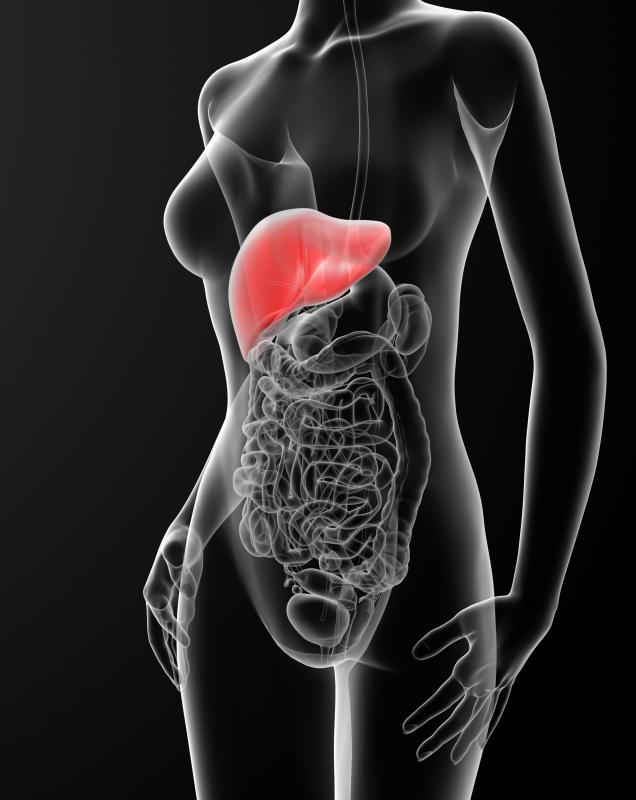At TheHealthBoard, we're committed to delivering accurate, trustworthy information. Our expert-authored content is rigorously fact-checked and sourced from credible authorities. Discover how we uphold the highest standards in providing you with reliable knowledge.
What is Glycogen?
Glycogen is a polysaccharide molecule stored in animal cells along with water and used as a source of energy. When broken down in the body, it is transformed into glucose, an important source of energy for animals. In animals, it plays a role similar to that played by starch in plants. A great deal of research has been done on this molecule and its role in the body ever since it was recognized as a critical part of the body's energy storage system.
Animal derive this molecule from carbohydrates, producing it in the liver, muscles, and digestive tract during the digestion process. Glycogen is stored in muscle tissue and in the liver, with levels tending to peak immediately after a meal. In humans, the body can store around 2,000 kilocalories of it at any given time. When people eat, levels are refreshed, with the body working to keep the amount as stable as possible so that there is a steady supply of energy.

Storage of this molecule is less efficient than that for fatty acids, which might lead some to wonder why the body doesn't store all energy in that form. There are several reasons for animals to engage in glycogen storage despite the questionable efficiency. The first is that the brain needs glucose, so requires energy reserves that will supply its needs. The second is that this molecule is used to regulate glucose levels in the blood between meals.

Athletes can experience a situation in which their reserves are depleted. This occurs in endurance activities, in which the body slowly uses up its supplies over the course of an event like a marathon. When this point is reached, it is sometimes referred to as “hitting the wall,” thanks to the strain it puts on the body. The athlete's size and condition have an effect on when she or he will hit the wall. Athletes attempt to avoid this by carb loading before events, and they also eat quickly after events to rebuild their reserves.

Some people have conditions known as glycogen storage diseases. Such conditions are usually genetic in nature, caused by problems with the genes which regulate the process of its creation and storage. People may also have trouble breaking down the molecule into glucose. Individuals with these conditions can experience a wide variety of health problems, depending on the type of disease they have, and how early it is identified.
AS FEATURED ON:
AS FEATURED ON:















Discussion Comments
I have tried the "fat burn" post glycogen, but the problem lies in that the body says no. The body has nothing in the tank so to speak and I nearly pass out. I workout with a recovery bar, thereby extending the complex carb stores. By drinking electrolyte solution during workout you can extend it.
I don't know how those "fat burners " do it. I literally can't, but I am thin and don't have to worry about it because I burn enough post workout to cover it. Fat burn is not efficient. Probably why we ate fruit in paleo era. It is hard to function neurological without glycogen which effects our balance and coordination. I am all for health but fear we will find this extreme fat loss technique to be harmful in the future. Plus look at any athlete and their diet, if you strive to be athletic.
@GenevaMech- To be honest with you, your body burns more fat when you have depleted your muscle and liver glycogen stores. When you have reached maximum glycogen breakdown, your body can actually burn up to 300% more fat according to different studies. Now whether or not you can sustain any sort of workout beyond that point is where the question lies.
Glycogen is essentially stored carbohydrates, so once the body depletes these reserves, than the body switches to burning stored fat. Once you "hit the wall”, a little rest and light exercise will allow the body to transition into fat burning mode. At this point, you should be able to continue exercise that will burn more fat calories.
This is the reasoning behind the theory of working out before you eat anything in the morning. Your body has essentially fasted overnight, so its glycogen stores are naturally depleted. You will burn more fat calories during your pre-breakfast work out than if you work out after you have carb-loaded.
@submariner- That does not sound like much fun. I am wondering if it is bad for your body when you “hit the wall”. What happens when you lose all muscle glycogen? Does your body actually lose muscle at this point? It cannot be good for your heart, muscles, and recovery. Does anyone know anything about this?
This was a very informative article on glycogen. I have hit the wall, and I find it interesting that it is actually like hitting a wall. At that point, I can no longer work out. I feel like I cannot even lift a muscle let alone a weight.
I usually work out until I hit the wall. After about two to three hours of working out, I will be physically unable to work out any more. These workouts have been great for my strength training, and as long as I eat properly after working out, my recovery is quick enough.
What I wonder is if there is any way to extend my glycogen reserves beyond two and a half hours. I feel like I could train better if I could work out longer. Will it help if I split my workouts into two a days? Will this help replenish glycogen in my body?
Post your comments